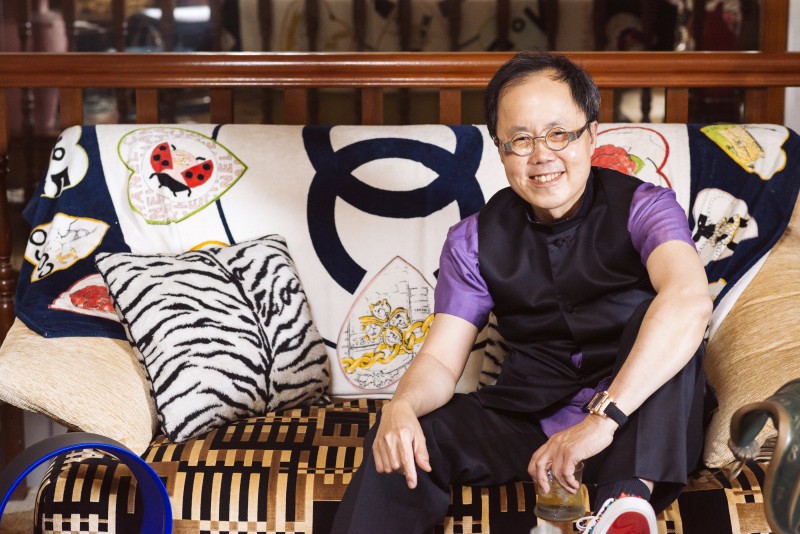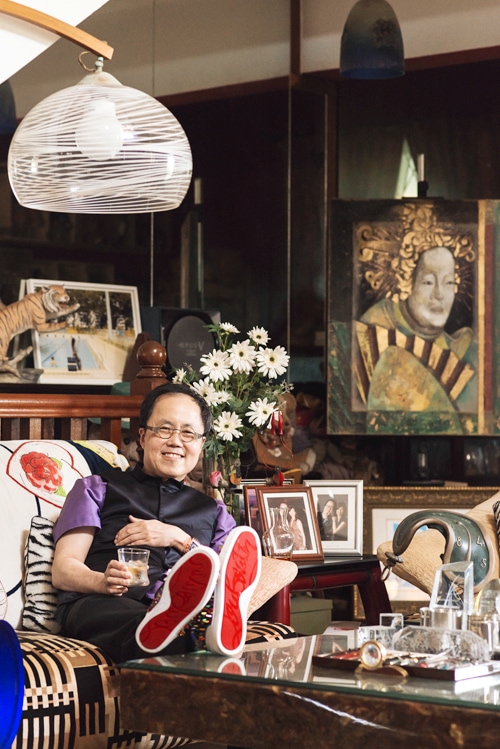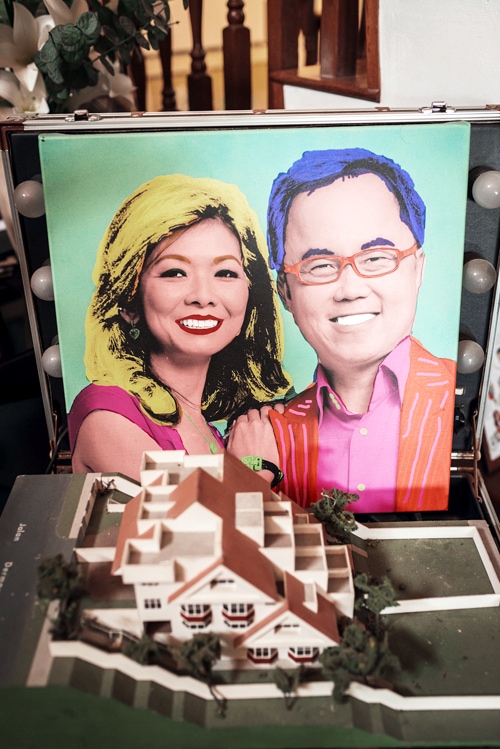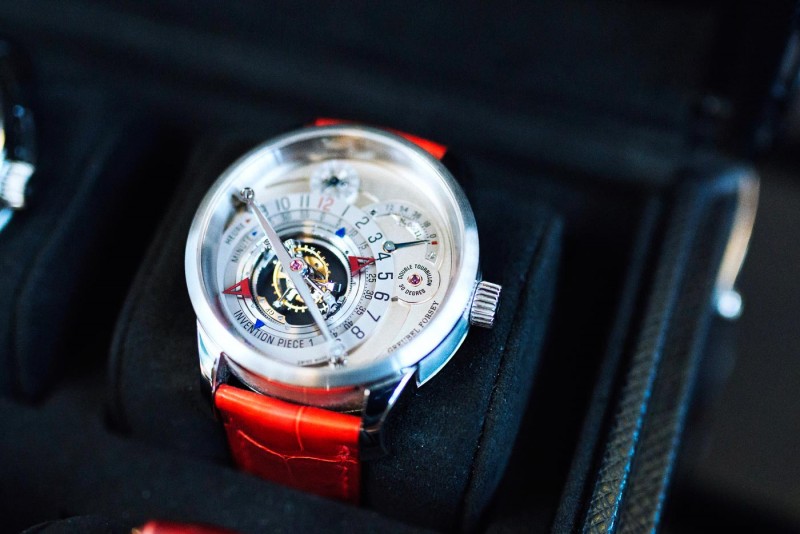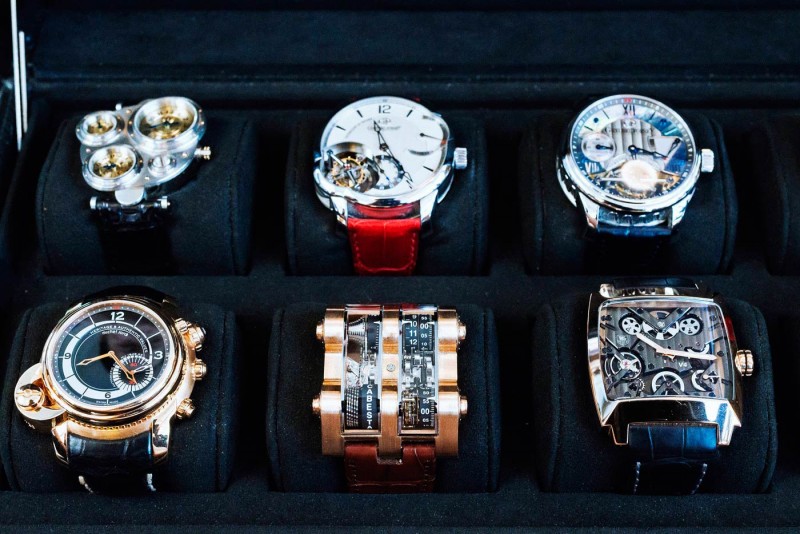“I’m a huge Clint Eastwood fan,” Dr Bernard Cheong tells me in a soft-spoken manner. It is a Saturday afternoon and he is all smiles, holding a glass of whiskey. Bernard is a bundle of energy in a Lilac short-sleeved shirt, mandarin collar vest and out of this world, multicoloured, custom-made Christian Louboutin sneakers with spikes protruding everywhere. His shoes seem to reflect his personality – bright and effervescent; two adjectives that are not typically associated with a 57-year-old doctor.
His gracious invitation to conduct the interview at his home, allows a personal insight into his extensive and rare watch collection which is estimated to be worth millions. As I walk pass his living room towards his study that also doubles up as an office space, I witness extreme clutteredness – an antique junkyard of sorts, but undeniably a much lavisher and opulent version: an original Melting Timepiece by Salvador Dali rests on the main table, inconspicuous, until Bernard educates me on its rarity – there are apparently only 350 pieces in the world. Shortly, I catch glimpses of an Andy Warhol-ish pop art portrait of him and his wife [Dolly], a huge Chanel beach towel draped over the sofa, two esoteric artworks, a hairdressing chair, and in the far right corner lies a teddy bear collection which I soon discover, belongs to his missus.
In his study room, piles of watch magazines are strewn across the floor; the gold ice kacang machine is not spared either and is made to ‘good use’ as a prop for more magazines. Bernard’s fascination with the Wild West is evident – a Longhorn cow skull stands out as a decorative statement piece and on its left horn; a cowboy hat, reminiscent of what Eastwood wore in Good, Bad & Ugly hangs precariously. “I had the extreme privilege of meeting Clint Eastwood in person and he has influenced me in many ways,” says Bernard. “When he made the movie Unforgiven, he was 62 at the time, and it was a huge turning point in his career. Like him, I want to embark on a new phase of my life in the next few years and focus on culture.”
On the surface, Bernard’s lifestyle is sophisticated, cultured and tasteful – one might even perceive it to be excessive and indulgent, yet as first-generation wealth, Bernard is surprisingly very humble and polite to the point of solicitousness. “Do you want any water? What can I get for you? I’m so sorry you had to wait so long – did I mess up your afternoon plans?” Bernard is delightful company and I assuage him that my entire afternoon is reserved especially for him. He relaxes and sips on his diluted whiskey before cautioning me that one should not work with the desire for pure monetary gain. “It’s almost like prostitution, you know? Mercenaries.”
Conversations with Dr Bernard Cheong
WY-LENE YAP: Did you always want to become a doctor?
BERNARD CHEONG: No. [laughs] Which part of my life are you referring to? When I was an adult or when I was a brainless idiot?
WY-LENE: [laughs] When you were younger.
BERNARD: No… I grew up in the 60s and 70s. The 70s were the formative years that made me who I am, and of course, the school [ACS] which I came from. In those days, life was harsh and people accepted it. You would be very lucky if you had electricity and a phone. At that time, I decided to drift along in life. I didn’t make any decisions until I had finished my A levels. I was the kind of person who just wanted to pass my exams. But, I did well for my A levels because I was scared that if I didn’t do well for this singular exam, it would alter the entire fate of my life. So I worked very hard for it and based on my results, I decided to become a doctor.
WY-LENE: Do you still perform any surgeries?
BERNARD: No, the moment I left the government practice, there was no turning back.
WY-LENE: What was the most intricate surgery that you had to perform during your days as a surgeon?
BERNARD: Simple things. The most intricate would probably be the removal of an appendix.
WY-LENE: Which government hospital did you work for?
BERNARD: Tan Tock Seng. But sometimes, I would have to go to Toa Payoh Hospital.
WY-LENE: Which department were you in?
BERNARD: Well, after I finished my housemanship which took me to every single hospital, they gave me an anesthesia traineeship and I really loved it. It was an honour to get that traineeship because the anesthetist is the only person who can save your life (at the roadside) – he’s the guy who knows everything about blood gas, how to keep your heart pumping, ICU machines, and how to restore a person after he has practically died, etc.
WY-LENE: So you were in Tan Tock Seng for a large part of your medical career – what did you do after that?
BERNARD: I decided to try my hand in pediatrics for 4 months. But I found out that I couldn’t handle it emotionally – I just can’t bear to see a kid die. I still hung out with surgeons more (just to find out what they were doing). After giving gas to patients, I was reading comic books and not paying attention to what was going on. [laughs]
WY-LENE: What kind of comic books did you like?
BERNARD: Spiderman, and it probably made me who I am today. I was involved in an auction for The Amazing Tales by either Sotheby’s or Christie’s in New York. Anyway, I lost that bid, but I suddenly realised that something so trivial could be worth so much money after a period of time. There is a huge difference between reading about it and experiencing it, and there is an element of excitement when you’re bidding for something… eventually, it went into the six-figure range and there were only 2 players left – me versus another well-known Singaporean.
WY-LENE: Currently, are you a GP?
BERNARD: Yeah, and I’m proud of it!
WY-LENE: You also founded Lifeline Medical Group in 1987. How many clinics do you have at the moment?
BERNARD: At one time, we had 19 clinics but we have trimmed ourselves down to 9.
In business, it’s dog-eat-dog and you have to be very street smart. It doesn’t take brains to be a doctor – it’s just a lot of studying.
WY-LENE: Which is harder: being a doctor or running a business?
BERNARD: I think running a business is much harder. When one enters a profession that has very strict guidelines and rules, you basically follow the rules and work your way through. But in business, it’s dog-eat-dog and you have to be very street smart. It doesn’t take brains to be a doctor – it’s just a lot of studying.
WY-LENE: Do you have any expansion plans?
BERNARD: At a particular stage in life (late fifties), if you’re still holding onto a company, people will want to buy your company and unless you receive a very good price that can make a significant change to your aspirations, one should not expand anymore. You have to activate your ‘second life’ – move on, and leave your current one behind. So, I’m going to leave Lifeline to my kids or their partners. It’s not going to be my primary focus anymore but I will still keep my clinic in Bukit Batok. The clinic has been the source of wealth (not money), wisdom and information. I have a very clear definition between factual knowledge and being informed. To me, the latter is more valuable because you’re able to sort out your facts and give an opinion. Having facts in your head can make you a brilliant/top student but when you ask the student to solve a problem, he can’t solve anything.
I actually brought the making of mechanical watches back into vogue.
WY-LENE: What does your ‘second life’ entail?
BERNARD: It will focus on culture. I think I have done enough for the watch industry to move and change it. I look back on the years when the Fondation de la Haute Horlogerie gave me a position as an ambassador and I thought it was their way of silencing me because I had been too harsh on the watch industry. When Cologni [Franco] called me, he explained in very classic Italian style and it meant a lot – so, I jolly well better represent watchmaking. I never saw what I did… as I felt I was more destructive than constructive. However, Cologni and the board members felt that whatever I had written on the Internet forums… I can’t bring myself to write it down because it almost sounds boastful, but I actually brought the making of mechanical watches back into vogue. People liked them and sought them out.
WY-LENE: You must be surprised when they made you the ambassador for the Fondation de la Haute Horlogerie in 2011.
BERNARD: Yeah! I thought I would be banned…
WY-LENE: Really?
BERNARD: I was very critical of the industry – in particular, the margins. At that time, I wasn’t informed despite having the knowledge. I didn’t have a mentor to tell me what was going on. The Swiss had the right to be secretive of what they did. Yet, there were people who were very kind to me like Günter Blümlein (he was the prime mover of IWC and Jaeger LeCoultre in early 80s and mid 90s. After the fall of the Berlin Wall, he set up A. Lange & Söhne and then sold it to Richemont) and my other really close friend, Rolf Schnyder.
People bought watches as status symbols rather than the philosophy behind it.
WY-LENE: What was it that made you so critical about the watch industry?
BERNARD: People bought watches as status symbols rather than the philosophy behind it. It’s not so much about the craftsmanship or fine watchmaking. Once you go into fine watchmaking, the average man on the street cannot afford it. But if you go into the philosophy behind a watch, even a cheap watch can be relevant. It is good base for thinking; something you can hold in your hand and in it, you can always see the making of an entire industrial empire. Today, car industries are having a rough time, but the watch industries are riding it out and they are able to morph themselves to fit almost every destructive era of human history – especially, the Second World War.
WY-LENE: How did your love of timepieces begin?
BERNARD: I wanted to belong so I asked my parents to buy me my first watch (Flyback Seiko Chronograph). Back in the day, I went to ACS (Barker Road) and it was like a finishing school in London, with all the who’s who – you could call it the ‘Tatler of Schools’. I grew up with Ng Eng Hen, Philip Ng… I managed to get in through the back door and there were only 60 seats available.
WY-LENE: What year was that?
BERNARD: 1965. I was in primary one. I was the only one who wasn’t invited to birthday parties because I wasn’t born with a silver spoon in my mouth. All my classmates often sat on aeroplanes just to visit their fathers. But I never sat on one, until I was an adult.
WY-LENE: Getting a watch was your first attempt at ‘fitting in’.
BERNARD: Yeah, it brought me closer. At least I walked around with a watch, while everyone else had a Rolex.
WY-LENE: After your first watch, did you feel the need to collect more?
BERNARD: Not yet as I didn’t have money to buy more.
A watch is like a photograph of your life and it will keep on changing as you age.
WY-LENE: At which point did you discover your passion for watches then?
BERNARD: In the army. When I entered, I discovered that everyone was just like me. Before that, I thought the rest of the world was like ACS because I didn’t read the newspapers. [laughs] One day, I was sitting in the forest in the rain and I realised the only memento after I left ACS, was my first watch because it encapsulated the essence of my memories in school. I knew I had left behind another life, but I still thank god that I’m from ACS – if I didn’t go there, I wouldn’t have known how lucky I was. A watch is like a photograph of your life and it will keep on changing as you age.
WY-LENE: So through watches, you’re also collecting memories.
BERNARD: Yes. It will also help you to focus your thoughts and bring out important points you may have forgotten – even as I’m talking to you right now. [looks at his pocket watch] The watch will inspire you when you look into the work that has gone into it and reflect on the prices which were originally pittance.
WY-LENE: How can you tell a fake Rolex from a real one?
BERNARD: That’s easy. Rolex has done a lot to ensure that their watches hard to duplicate. Look for the little crown (laser engraved) on the crystal. You can also feel its quality.
WY-LENE: What does your wife think about your obsession with watches?
BERNARD: It took me a year to convince her. Out of the two of us, my wife is the smarter one. She also has a very strong grasp of philosophy and culture and she told me that I could achieve my dream of being relevant.
WY-LENE: Haven’t you accomplished that already?
BERNARD: Yeah, I think so. I brought a little city called Neuchâtel [Switzerland] to life by championing for their watchmaking factories. It was almost abandoned, but today, it is a bustling city.
WY-LENE: How big is your watch collection?
BERNARD: Over a thousand.
WY-LENE: Where do you keep them?
BERNARD: Mostly in banks, but I have some (around 100) in my house too.
You must never be in a position where you’re forced to sell and finding the right buyer is key.
WY-LENE: How much is your entire collection worth?
BERNARD: Millions. The chances of a watch collection depreciating are highly unlikely. You must never be in a position where you’re forced to sell and finding the right buyer is key.
WY-LENE: Do you wear them often? Or are they admired and appreciated from afar?
BERNARD: I certainly wear them! I hope that none of them will ever be sold. Sometimes, I can wear 3 to 4 different watches in a day.
WY-LENE: What’s your most expensive timepiece?
BERNARD: Greubel Forsey Invention Piece 1 worth $2.2 million. There are only eleven in this world.
WY-LENE: If I were to invest in my first timepiece, what would your recommendation be?
BERNARD: You should try to push the limit in terms of how much you can afford. Try to avoid timepieces without diamonds (you tend to pay quite a high premium for it) and pay extra attention to the quality of diamonds. Try to purchase something simple and popular, yet rare. You need to search in the catalogues for watches that were made in the 1990s (from 1991-1998).
WY-LENE: Any brand will do?
BERNARD: Your heart will definitely speak to you.
WY-LENE: Which country makes the best watches?
BERNARD: Switzerland.
WY-LENE: With the Swiss National Bank abandoning the cap on the value of the franc against the Euro, do you think consumers will be affected?
BERNARD: A lot of companies, to a large extent, stated that they would stick to the old prices.
WY-LENE: But we know that’s not true.
BERNARD: Yeah, sales are going to drop for a while. Inevitably, consumers will have to pay 10 to 20 percent more in the next year.
WY-LENE: What do you think of the Apple Watch?
BERNARD: The Apple Watch was probably conceived a long time ago, when Steve [Jobs] was still alive. I met Steve on three occasions (I’m not a good reader of people) but he was a guy, who did everything he wanted – not all of his ideas succeeded though. He’s a mad guy and he actually thought of making a watch at a time where people would have thought; making such a silly thing would be made redundant by his very own computers. I think a lot of people will buy it as the product begins to stratify upwards – like a gold Apple Watch.
WY-LENE: Will you buy the $17K gold Apple Watch?
BERNARD: I wouldn’t. In fact, I will buy the cheapest one. The Apple Watch will become a throw away item – a paperweight.
Once the first model of the Apple Watch becomes a paperweight, they are going to realise that they need to own a timepiece that lasts forever.
WY-LENE: Do you think the Apple Watch has caused a disruption in the watch industry?
BERNARD: No. It brings the focus back to watches again. Similarly, digital cameras managed to piqued people’s interest in photography and these were the kind that never took pictures in their lives. So it’s going to bring in that part of the market – people who never wore a watch in the first place. Once the first model of the Apple Watch becomes a paperweight, they are going to realise that they need to own a timepiece that lasts forever.
WY-LENE: What timepiece are you planning to buy next?
BERNARD: I think I have bought everything.
WY-LENE: [laughs] Are your children also interested in watches?
BERNARD: Yeah, my younger daughter – she will bother to ask and take an interest in what I’ve bought.
If you’re in a position to choose what you want to do in the afternoon, or tomorrow, or even the rest of your life… you’re successful.
WY-LENE: What does success mean to you?
BERNARD: Having choices. If you’re in a position to choose what you want to do in the afternoon, or tomorrow, or even the rest of your life… you’re successful. Success is never a permanent thing unless you use money to define it.
WY-LENE: What’s your greatest fear in life?
BERNARD: I’m a very sentiment person. My greatest fear in life is losing my family. Having a family changes your perimeters of success and ideals almost immediately. I will do anything for my wife and children. Before that, you’re a free agent.
WY-LENE: Do you think one day we will discover a cure for cancer?
BERNARD: Surely. It’s almost like a no-brainer. The rules that we adhere to in medicine is such that very few people dare to stick their necks out and use an unapproved cancer drug to save a patient. Approval of cancer drugs will take a long time.
